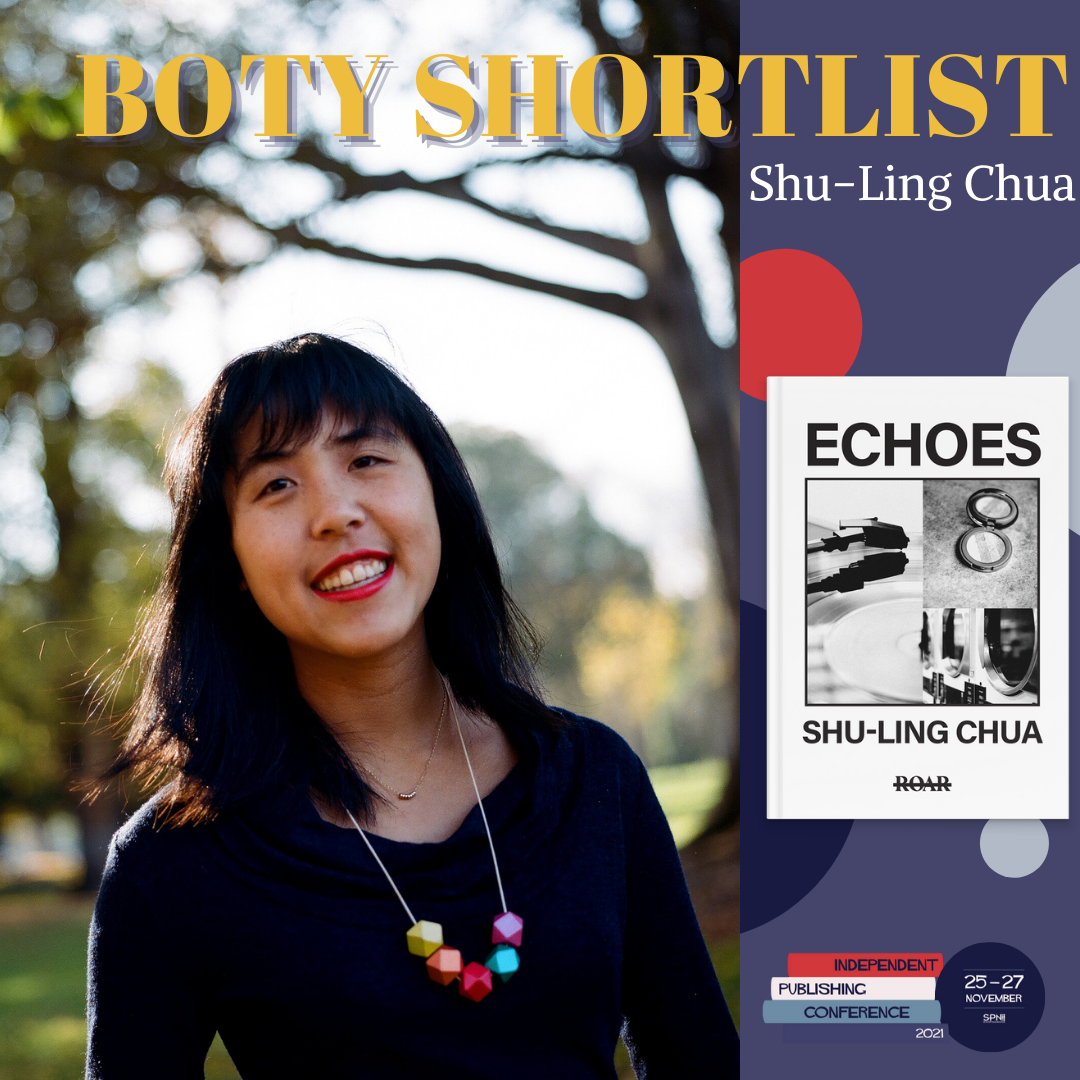In conversation with BOTY shortlisted author: Shu-Ling Chua
Shu-Ling Chua is a is Melbourne-based essayist, poet and critic whose work has appeared in Peril Magazine, Lindsay, Meanjin, Triangle House Review, and Asian American Writers’ Workshop, among others. Her debut essay collection, Echoes, was published in 2020.
Echoes is a collection of personal essays that reference art and literature, pop culture and nostalgia. The book has been shortlisted for SPN’s 2021 Book of the Year Award.
Holly Hendry-Saunders from The Small Press Network interviewed Shu-Ling about Echoes, the inspiration behind the book and the response it’s received.
Creating Echoes and the inspiration behind the book
Shu-Ling Chua was born in Melbourne to Malaysian-Chinese parents and the idea for Echoes grew from her desire to connect with her maternal grandmother, Ah Ma. She wanted to write about their shared love of fashion and old Chinese pop songs, Shu-ling confesses it took a while to work out where to start.
‘While researching the Crazy Rich Asians soundtrack, I stumbled across a black and white film clip of Lin Dai ‘singing’ 不了情, dubbed by Koo Mei. The song, together with Lin’s/Koo’s heartbreak, gave me shivers. I played it on repeat and patiently translated it line by line. At the time of writing Echoes, I was interested in the idea of lineages, not just familial lineages but literary, visual, and music lineages,’ she said.
For Shu-Ling the word ‘echoes’ means continuation—growing softer but persisting, nevertheless.
Shu-Ling’s writing process
The short collection includes three chapters ‘(Im)material Inheritances’, ‘Echoes’ and ‘Fish to the moon’. When asked about her writing process Shu-Ling said ‘when Fran Berry approached me about putting together a collection, I had published the first essay, ‘(Im)material Inheritances’, and was close to completing the title essay … I had written them as part of a workshop with the wonderful Ellena Savage and knew they would pair well.’
‘The closing essay was tricky to sequence as its scope ranges from the role of water in our lives to seeking balm in the swish of washing machines. On a deeper level, it is interested in movement and impossibility. I’m so grateful to my editor Camha Pham!
‘My process is to gather and draw connections between the images and ideas that intrigue me. I like to start with a mood board or list and follow my intuition. I rarely know what an essay is “about” until I finish. It’s really inefficient but I’ve always used writing to work through a question or questions. I have a day job, so I don’t rely on writing for income; I’m able to take my time.
‘Writing Echoes was a way to draw closer to my family’s history, but I don’t see it as a story about “returning to my roots” or “connecting with my culture”. I wrote about my personal interests and obsessions—pop songs, glamorous singer-actresses, translation—all of which, by coincidence, could be loosely categorised as “culture”. Culture however is not monolithic, and my cultural heritage is one facet of who I am. One’s relationship with cultural heritage is ever-changing.’
Shu-Ling’s objective was to push beyond many publishers’ preoccupation with pain, trauma, and narrow conceptions of identity. ‘I felt I achieved this. I wrote the essays without expectation of publication, so it was a playful, freeing experience,’ she said.
The reader response to Echoes
Shu-Ling wrote Echoes for children of migrants, and she has received a lot of feedback from her target audience. ‘The response has been absolutely beautiful. I love seeing everyone’s photos and messages and am grateful to Dženana Vucic, Natasha Hertanto and Jasmeet Sahi for their long-form responses,’ she said.
Shu-Ling said she deliberately didn’t translate the Cantonese and Mandarin passages in Echoes: ‘I really appreciate how Dženana understood what I was trying to achieve, especially in regard to my linguistic inbetween-ness. I’ve also enjoyed a delightful conversation with a reader on the history and pop culture of coin laundries.’
Shu-Ling’s parents and brother read the manuscript for typos and accuracy, but she hasn’t shared Echoes with her extended family. ‘I wish I could share it with Ah Ma, but she doesn’t read English. I think Mum is proud and happy. The essays draw heavily on our conversations, memory and nostalgia. She’s a wonderful storyteller.’
Shu-Ling’s plans for the future and her devotion to learning old Chinese pop songs
Shu-Ling hopes to publish a full-length essay collection and she is currently working on more essays about fashion, photography, music, interiors/interiority and the blurry boundaries between private and public. ‘I’m currently working on an essay about smudged lipstick. I’m interested in smudged lipstick as proof of action, whether this be post-meal, post-sex, post-reading. I’m also interested in the ephemerality of smudged lipstick vs. “pics or it didn’t happen”.’
‘After recently watching Wong Kar Wai’s Chungking Express, I taught myself to sing 梦想, Faye Wong’s Cantonese cover of The Cranberries’ song Dreams. I wish I could have launched Echoes with karaoke!,’ she said.
The 2021 Book of the Year award winner will be presented by the Wheeler Centre as part of its Next Big Thing series, via Instagram Live on 26 November 2021 from 6:30pm.
You can buy a copy of Echoes, all the other BOTY-shortlisted books and books written or published by IPC2021 speakers at the special SPN bookstall powered by Readings.

